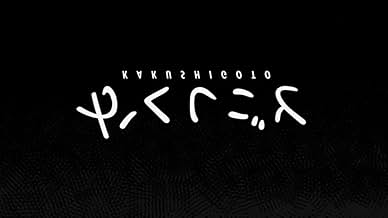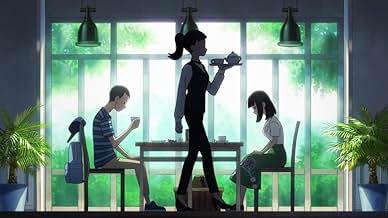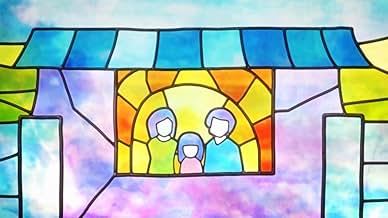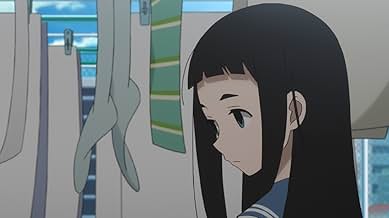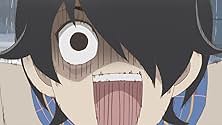NOTE IMDb
7,3/10
1,1 k
MA NOTE
Un écrivain d'histoires obscènes tente de garder son travail secret de sa fille innocente.Un écrivain d'histoires obscènes tente de garder son travail secret de sa fille innocente.Un écrivain d'histoires obscènes tente de garder son travail secret de sa fille innocente.
- Récompenses
- 2 victoires et 6 nominations au total
Parcourir les épisodes
Avis à la une
Secrets. Parents can't raise their children without them. My mom practically raised me on her own since my parents separated when I was young. At the risk of sounding conceited, I think she did a great job. Recently she shared a few secrets with me that she couldn't tell me as a kid. Now that I'm 20, I understand why she needed to keep secrets, to protect me.
Kakushi Goto is a neurotic single father and a mangaka. If you ever asked him what he does for a living... he'd lie. Not because he's a bad person, because he's determined to protect his eleven-year-old daughter, Hime, from learning that he draws ecchi.
Kakushigoto captures the feeling of being a kid to a single parent whose doing everything they can on their own. There's no guidebook to raising a child. Since Kakushi's wife passed, he has done everything in his power to shield his daughter from the world. His anxiety-induced parental neurosis is often hilarious and exaggerated to the point of insanity. The humor is derived at his expense. Over and over, he catastrophizes and imagines the worst possible outcome. Whether it be fearing his daughter fell into a well, or that his manga may get canceled sending them into poverty. This kind of humor, rooted in a relatable and sympathetic reaction, is fantastic. Admittedly, there is a fine line between being hilariously perceptive and just plain ridiculous. Kakushigoto constantly teeters on that line, but it has a remarkable ability to fall on the right side of absurdist comedy.
Whilst he juggles his secret career with the responsibilities as a father and learning how to raise Hime all on his own, Kakushi also deals with personal problems. Shame, self-confidence, imposter syndrome, and the impending threat of deadlines. The author constantly pokes fun at the plights of being a mangaka: Underpaid, overworked, stressed.
I sympathize with Kakushi's rush to finish his work because I do my best work right before the deadline. His ongoing rivalry with his editor makes for some of the best cynical banter in the show. They're always at each other's throats with passive-aggressive comments. This anime doesn't sugarcoat the life of a full time mangaka. I learned a bit about the processes of producing manga and the editing process. Kakushi's four assistants aren't extraordinarily deep, but their self-deprecating humor and jabs at their boss are pretty funny. Kakushi's employees are named after different phrases commonplace to mangaka artists. Plenty of other jokes are rooted in the Japanese language. Though the translators made it watchable, a few jokes were lost.
Kakushi is either too conceited about his work or too shameful that he makes a living by drawing dirty jokes. His personality and goals are at odds, he wants to become a famous mangaka, but if he's in the spotlight, Hime may find out his real identity. There's a somber moment where Hime tells her dad she wants him to become someone important. She knows that'd make him happy, but it simply couldn't happen. Kakushi tells her he wants her to grow up well. Ironically, their wishes contradict each other, but it is heartfelt nonetheless. Kakushi may be a busy single dad, but he does have a lot of friends to help take care of Hime. Throughout the day, friends visit the Goto residence to see Hime. Like most of the characters, Hime is adorably airheaded. To compensate, she's as perceptive and empathetic as a real kid. She can tell her family is distinctly different from others, without a mother, and that her father struggles to take care of himself, his home, and his daughter. At one point she worries about inviting too many friends to her birthday party because of the stress it'd put on her dad, so she sacrifices her fun for her dad's well being. Moments like these broke my heart. I know what it's like to worry so much about my parents that I give up something for their well being. Nowadays I understand what my parents had to sacrifice to raise me.
Beneath the surface of this goofy show lies melancholy that sneaks up on you when you least expect it. Even after she passed away, Hime's mother still helps raise her daughter through boxes she prepared for her birthdays, full of symbolic gifts. One curiosity of the Goto family you'll immediately notice is their home. They live in a modest one-story home that looks out of place in their neighborhood. Kakushi replicated his old family home when he lived with Hime's mother so he could maintain his memories of an ideal family. The secrets that lie within their original home form somber epilogue chapters to every episode. The epilogues flash forward to Hime's life six years later where her Kakushi is mysteriously gone. These chapters are completely tonally at odds with the fun-loving atmosphere of the main story. Strangely they stoked my interest each episode until the final reveal.
Most of the humor is reliant on misunderstandings, which might bother some people. For me, it just worked. Even though it didn't always make me laugh out loud, it never failed to put a smile on my face. Kakushigoto captures the special kind of sincere family comedy that warmed my heart each episode.
Kakushi Goto is a neurotic single father and a mangaka. If you ever asked him what he does for a living... he'd lie. Not because he's a bad person, because he's determined to protect his eleven-year-old daughter, Hime, from learning that he draws ecchi.
Kakushigoto captures the feeling of being a kid to a single parent whose doing everything they can on their own. There's no guidebook to raising a child. Since Kakushi's wife passed, he has done everything in his power to shield his daughter from the world. His anxiety-induced parental neurosis is often hilarious and exaggerated to the point of insanity. The humor is derived at his expense. Over and over, he catastrophizes and imagines the worst possible outcome. Whether it be fearing his daughter fell into a well, or that his manga may get canceled sending them into poverty. This kind of humor, rooted in a relatable and sympathetic reaction, is fantastic. Admittedly, there is a fine line between being hilariously perceptive and just plain ridiculous. Kakushigoto constantly teeters on that line, but it has a remarkable ability to fall on the right side of absurdist comedy.
Whilst he juggles his secret career with the responsibilities as a father and learning how to raise Hime all on his own, Kakushi also deals with personal problems. Shame, self-confidence, imposter syndrome, and the impending threat of deadlines. The author constantly pokes fun at the plights of being a mangaka: Underpaid, overworked, stressed.
I sympathize with Kakushi's rush to finish his work because I do my best work right before the deadline. His ongoing rivalry with his editor makes for some of the best cynical banter in the show. They're always at each other's throats with passive-aggressive comments. This anime doesn't sugarcoat the life of a full time mangaka. I learned a bit about the processes of producing manga and the editing process. Kakushi's four assistants aren't extraordinarily deep, but their self-deprecating humor and jabs at their boss are pretty funny. Kakushi's employees are named after different phrases commonplace to mangaka artists. Plenty of other jokes are rooted in the Japanese language. Though the translators made it watchable, a few jokes were lost.
Kakushi is either too conceited about his work or too shameful that he makes a living by drawing dirty jokes. His personality and goals are at odds, he wants to become a famous mangaka, but if he's in the spotlight, Hime may find out his real identity. There's a somber moment where Hime tells her dad she wants him to become someone important. She knows that'd make him happy, but it simply couldn't happen. Kakushi tells her he wants her to grow up well. Ironically, their wishes contradict each other, but it is heartfelt nonetheless. Kakushi may be a busy single dad, but he does have a lot of friends to help take care of Hime. Throughout the day, friends visit the Goto residence to see Hime. Like most of the characters, Hime is adorably airheaded. To compensate, she's as perceptive and empathetic as a real kid. She can tell her family is distinctly different from others, without a mother, and that her father struggles to take care of himself, his home, and his daughter. At one point she worries about inviting too many friends to her birthday party because of the stress it'd put on her dad, so she sacrifices her fun for her dad's well being. Moments like these broke my heart. I know what it's like to worry so much about my parents that I give up something for their well being. Nowadays I understand what my parents had to sacrifice to raise me.
Beneath the surface of this goofy show lies melancholy that sneaks up on you when you least expect it. Even after she passed away, Hime's mother still helps raise her daughter through boxes she prepared for her birthdays, full of symbolic gifts. One curiosity of the Goto family you'll immediately notice is their home. They live in a modest one-story home that looks out of place in their neighborhood. Kakushi replicated his old family home when he lived with Hime's mother so he could maintain his memories of an ideal family. The secrets that lie within their original home form somber epilogue chapters to every episode. The epilogues flash forward to Hime's life six years later where her Kakushi is mysteriously gone. These chapters are completely tonally at odds with the fun-loving atmosphere of the main story. Strangely they stoked my interest each episode until the final reveal.
Most of the humor is reliant on misunderstandings, which might bother some people. For me, it just worked. Even though it didn't always make me laugh out loud, it never failed to put a smile on my face. Kakushigoto captures the special kind of sincere family comedy that warmed my heart each episode.
The title 'Kakushigoto' means secrets, and 'Kakushi Gotou' is the father's name, which can be translated as a drawing job. Gotou hides some secrets from his daughter, Hime, to avoid embarrassment. However, his secrets are more than just a vulgar mangaka. The show highlights Gotou's silly yet effective attempts to hide his secrets, resembling an overly-cautious dad trying to raise his oblivious daughter. His voice actor, Hiroshi, can switch between a playful and serious tone, matching his character build. Hime, voiced by Emilia from ReZero and Megumin from Konosuba, has a childish and innocent type of kindness. The duo is a great pick for this show.
A sweet, innocent and funny story about a unique father-daughter relationship. This is a heartwarming story with a creative story-telling structure. It does a great job at maintaining it's comedy while also setting itself up for an emotional ending.
Awww man folks....we have been really treated spoilt to another father-daughter anime this year. The relationship between Goto and Hime was absolutely precious like the pair of them just melt your heart into pieces!
This anime and Somali & the Spirit Forest have been definitely giving me lots of onions in terms of what goes on behind the scenes of Goto's secret in attempting to hide his job from his daughter. It even gives us a sense of reality to what an mangaka does for a living. The lighthearted comedy makes you laugh but at the same time, there's always confusing depressing scenes to the future at the end of each episode. As a viewer, you really wouldn't have a clue on what's going on with Goto and Hime.
I'm not gonna bother telling you lot to what happened because this anime is so so worth everyone's time whether they hate slice of life stuff or not.
I thoroughly enjoyed this anime, it was emotional, funny and just heartwarming. Now if you'll excuse me, I'm going to cry in the corner because of the ending.😭
This anime and Somali & the Spirit Forest have been definitely giving me lots of onions in terms of what goes on behind the scenes of Goto's secret in attempting to hide his job from his daughter. It even gives us a sense of reality to what an mangaka does for a living. The lighthearted comedy makes you laugh but at the same time, there's always confusing depressing scenes to the future at the end of each episode. As a viewer, you really wouldn't have a clue on what's going on with Goto and Hime.
I'm not gonna bother telling you lot to what happened because this anime is so so worth everyone's time whether they hate slice of life stuff or not.
I thoroughly enjoyed this anime, it was emotional, funny and just heartwarming. Now if you'll excuse me, I'm going to cry in the corner because of the ending.😭
A funny and lighthearted anime to watch (I haven't read the manga). I love how at the end of each episode, the scene shifts from past to present life, slowly revealing what is occurring at the current time. This anime also tells me a lot about days in the life of a manga artist. The comedy is great and I laughed many times.
Le saviez-vous
- AnecdotesThe writer's name is Kakushi Goto. It is a double pun:
- the word "kakushigoto" is Japanese for "secret", alluding to Goto keeping his job secret.
- it can also be written as "kaku shigoto", or "drawing job", alluding to Goto's job as a manga writer/artist.
- ConnexionsReferenced in Trash Taste After Dark: Reacting to The Anime Awards (2021)
Meilleurs choix
Connectez-vous pour évaluer et suivre la liste de favoris afin de recevoir des recommandations personnalisées
- How many seasons does Kakushigoto have?Alimenté par Alexa
Détails
- Durée23 minutes
- Couleur
Contribuer à cette page
Suggérer une modification ou ajouter du contenu manquant

Lacune principale
By what name was Kakushigoto (2020) officially released in Canada in English?
Répondre
